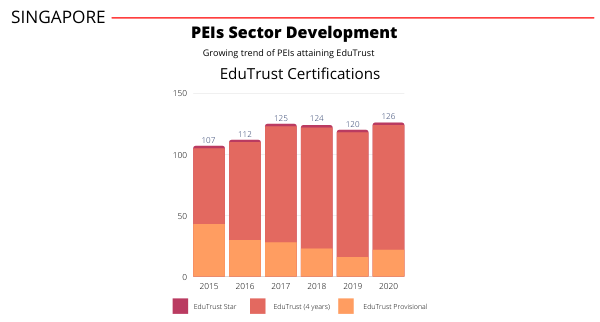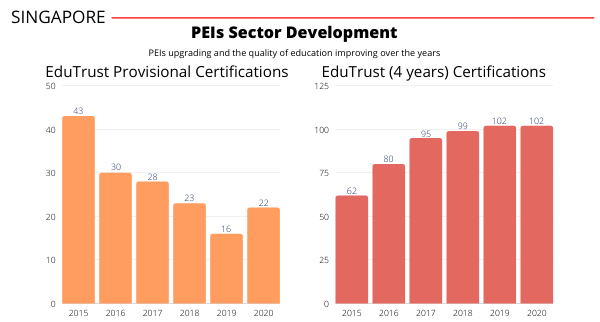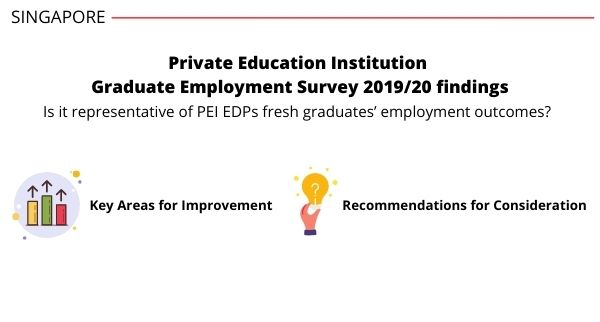EduTrust certification is a hallmark of quality for Private Education Institutions (PEIs) in Singapore, symbolizing adherence to high standards in academic management, student protection, and quality assurance. However, the process of maintaining this certification can be challenging, and PEIs may face the risk of downgrade. This article outlines strategies on how to prevent EduTrust downgrade, the steps to upgrade certification, and the best practices for maintaining high standards.
Understanding EduTrust Downgrade
An EduTrust downgrade can occur when a PEI fails to meet the required standards during the EduTrust assessments. This can be due to various factors such as poor academic quality, inadequate student support, financial instability, or non-compliance with regulatory requirements. The consequences of a downgrade include reputational damage, loss of trust among stakeholders, and potential operational disruptions.
How to Prevent EduTrust Downgrades
In Singapore’s competitive private education landscape, EduTrust certification isn’t just a ‘badge’ but a testament to quality, a magnet for students, and a cornerstone of institutional growth. Whether you’re aiming for your initial certification or striving to maintain your prestigious EduTrust status, a strategic approach is paramount. Here are key strategies to prevent losing or downgrading EduTrust status:
1. Regular Internal Audits
Regular internal audits are key to staying compliant with EduTrust standards. These audits involve a thorough review of your institution’s processes, helping you to quickly spot and address any potential issues before they escalate. By regularly checking your operations, you ensure that your institution remains aligned with EduTrust requirements throughout the certification period. This proactive strategy helps to prevent non-compliance and keeps your institution on track with minimal disruption.
2. Strong Quality Assurance Framework
Implement a robust quality assurance framework that includes regular reviews of all key areas including academic programs, student services, and administrative processes. By consistently evaluating these aspects, you can spot any areas that need improvement early on and address them before they become bigger problems. This approach not only helps maintain high standards but also ensures that your institution is always aligned with EduTrust requirements.
3. Dedicated Compliance and QA Department
Establish an independent QA department dedicated to ensuring compliance with EduTrust standards. This team should be responsible for conducting regular, objective audits and addressing any compliance issues quickly, ensuring your institution stays aligned with all regulatory requirements. By having a team well-versed in EduTrust requirements, your institution can minimize the risk of non-compliance, maintain continuous adherence to regulatory standards, and safeguard its EduTrust certification status.
How to Upgrade and Maintain the EduTrust Status
1. Address Areas of Weakness
After an initial assessment, focus on areas where the institution received lower scores. By understanding the root causes of these deficiencies, you can implement targeted improvements that directly address the underlying issues. It’s also important to involve relevant stakeholders such as faculty, staff, and management, in the improvement process to ensure a comprehensive and collaborative approach.
2. Risk Management
Effective risk management is key to safeguarding your EduTrust status. This involves a proactive approach to identifying potential risks that could relate to financial stability, regulatory compliance, academic quality, or student satisfaction. Once risks are identified, develop and implement strategies to mitigate them before they escalate into larger problems. This could include enhancing internal controls, improving communication channels, or investing in staff training.
3. Continuous Improvement
Foster a culture of continuous improvement. Regularly review and update your policies, procedures, and practices to ensure they align with the latest EduTrust requirements and industry best practices. Small adjustments, like refining administrative workflows or updating teaching methods, can make a big difference over time. By consistently focusing on making improvements, your institution will not only stay compliant but also continue to enhance the overall experience for students and staff.
The Intricacies of EduTrust
Preventing EduTrust downgrade, upgrading certification, and maintaining high standards require a proactive and comprehensive approach. By implementing robust quality assurance frameworks and engaging in continuous improvement, PEIs can ensure they not only retain but also enhance their EduTrust certification. At EduValue, we stand ready to offer specialized services that guide institutions through these challenges, ensuring compliance and fostering a culture of educational excellence. By working together, we can uphold and elevate the standards of education, benefiting both institutions and students alike.
Written By, EduValue Industry Research Team.





